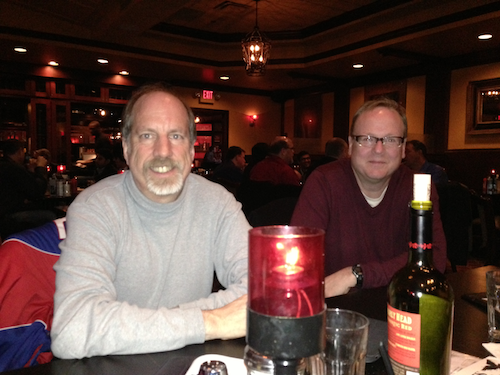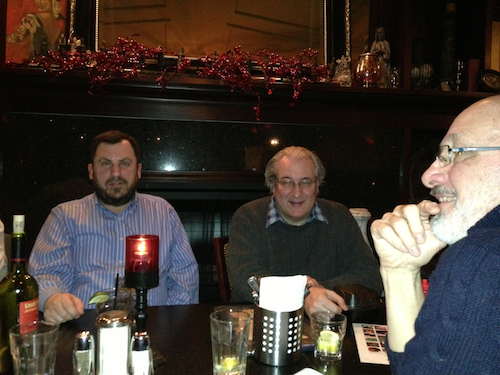Smalltalk Jobs Site
James Savidge has moved his Smalltalk blog site. You can subscribe here.
Tags: jobs
The author of this blog, James Robertson, passed away in April 2014. This blog is being maintained by David Buck (david@simberon.com).
James Savidge has moved his Smalltalk blog site. You can subscribe here.
Tags: jobs
I think this was inevitable - other than gamers (who are always after the fastest/newest equipment), very few people need a new machine - anything made within the last five years or so works just fine for most business needs:
It has now been four months since Windows 8 was released, and the latest figures show that its growth — in terms of market share, mind share, and the number of apps in the Windows 8 Store — is almost at a standstill.
That said, MS can't be happy about this comparison:
It’s a bitter pill to swallow, but Windows Vista actually enjoyed faster growth than Windows 8
Ouch
Tags: windows 8
You have to love the way big companies operate (other than Apple - the kind of issue I had with MS this morning simply has not happened to me with Apple):
This chewed up 45 minutes of my day (most of it on hold). The part I really don't understand is the suspension message, since customer service told me that there was no account suspension. Nice to know that MS can build informative websites....
Today's Smalltalk 4 You looks at reflection using instance variable names. If you have trouble viewing it here in the browser, you can also navigate directly to YouTube. To watch now, click on the image below:
If you have trouble viewing that directly, you can click here to download the video directly. If you need the video in a Windows Media format, then download that here.
You can also watch it on YouTube:
Today we'll put a few pieces together on reflection in Smalltalk. Let's assume that you've read some data from an external source into a dictionary, with data like this:
dict := Dictionary new. dict at: 'id' put: 101. dict at: 'first' put: 'James'. dict at: 'last' put: 'Robertson'.
Now, what if you want to create an instance of class Person and fill it with that data - but not using the sort of slot binding approach assumed by #instVarAt:put:? Consider the following:
person := Person new. dict keysAndValuesDo: [:key :value | | msg | msg := (key, ':') asSymbol. person perform: msg with: value]. ^person
Notice how we assume that the dictionary keys are the names of variables, and we construct the messages that get sent to the object. Realistically, you would want exception/error handling around that, for cases where the file format and the class format get out of synch - but that's the basic approach, and it's used commonly in Smalltalk.
Need more help? There's a screencast for other topics like this which you may want to watch. Questions? Try the "Chat with James" Google gadget over in the sidebar.
Tags: smalltalk, reflection, va smalltalk
Enclosures:
[st4u351-iPhone.m4v ( Size: 931310 )]

|
Today's Javascript 4 You looks at the diections service in Google maps. If you have trouble viewing it here in the browser, you can also navigate directly to YouTube. Join the Facebook Group to discuss the tutorials. You can view the archives here. |
To watch now, click on the image below:
If you have trouble viewing that directly, you can click here to download the video directly. If you need the video in a Windows Media format, then download that here.
You can also watch it on YouTube:
Tags: javascript, maps
Enclosures:
[js4u249-iPhone.m4v ( Size: 913188 )]
Had dinner tonight with a bunch of Smaltalkers (all of them from CenturyLink) here in Minneapolis. Dave Hasegawa put the meetup together - we took some photos at Hells Kitchen



If you ever get to Hells Kitchen, check out the pictures on the bathroom walls :)
Today's Smalltalk 4 You looks at configurations in Pharo - no more wondering which magical incantation to perform in order to get some code to load :). If you have trouble viewing it here in the browser, you can also navigate directly to YouTube. To watch now, click on the image below:
If you have trouble viewing that directly, you can click here to download the video directly. If you need the video in a Windows Media format, then download that here.
You can also watch it on YouTube:
Tags: smalltalk, pharo, configurations
Enclosures:
[st4u350-iPhone.m4v ( Size: 833020 )]
I noticed that the app I'm working on does a fair bit of GC right as it starts (this is ObjectStudio). Turns out, there was a really cheap win, as you can see from the results below:
ObjectMemory dynamicallyAllocatedFootprint 78967736 ObjectMemory currentMemoryPolicy growthRegimeUpperBound 48000000
Pretty simple - just move the growth regime past the base memory size, and you get an immediate boost. Next up - figure out whether that starting size is optimal.
Tags: objectstudio

|
Today's Javascript 4 You looks at draggable waypoints in maps using Javascript. If you have trouble viewing it here in the browser, you can also navigate directly to YouTube. Join the Facebook Group to discuss the tutorials. You can view the archives here. |
To watch now, click on the image below:
If you have trouble viewing that directly, you can click here to download the video directly. If you need the video in a Windows Media format, then download that here.
You can also watch it on YouTube:
Tags: javascript, maps
Enclosures:
[js4u247-iPhone.m4v ( Size: 1145701 )]
Today's Smalltalk 4 You looks at the emergency evaluator in Pharo. If you have trouble viewing it here in the browser, you can also navigate directly to YouTube. To watch now, click on the image below:
If you have trouble viewing that directly, you can click here to download the video directly. If you need the video in a Windows Media format, then download that here.
You can also watch it on YouTube:
Enclosures:
[st4u349-iPhone.m4v ( Size: 553290 )]
Welcome to episode 116 of Independent Misinterpretations - a Smalltalk and dynamic language oriented podcast with James Robertson and David Buck.
This week Dave and I talked about ObjectStudio. As it happens, I've just started a cntract working in that environment, so it seemed like a good time for some "initial" thoughts about the state of ObjectStudio.
You can subscribe to the podcast in iTunes (or any other podcatching software) using this feed directly or in iTunes with this one.
To listen now, you can either download the mp3 edition, or the AAC edition. The AAC edition comes with chapter markers. You can subscribe to either edition of the podcast directly in iTunes; just search for Smalltalk and look in the Podcast results. You can subscribe to the mp3 edition directly using this feed, or the AAC edition using this feed using any podcatching software. You can also download the podcast in ogg format.
If you like the music we use, please visit Josh Woodward's site. We use the song Troublemaker for our intro/outro music. I'm sure he'd appreciate your support!
If you have feedback, send it to jarober@gmail.com - or visit us on Facebook - you can subscribe in iTunes using this iTunes enabled feed.. If you enjoy the podcast, pass the word - we would love to have more people hear about Smalltalk!
Tags: objectstudio, smalltalk
Enclosures:
[im116.m4a ( Size: 17751222 )]
Welcome to episode 116 of Independent Misinterpretations - a Smalltalk and dynamic language oriented podcast with James Robertson and David Buck.
This week Dave and I talked about ObjectStudio. As it happens, I've just started a cntract working in that environment, so it seemed like a good time for some "initial" thoughts about the state of ObjectStudio.
You can subscribe to the podcast in iTunes (or any other podcatching software) using this feed directly or in iTunes with this one.
To listen now, you can either download the mp3 edition, or the AAC edition. The AAC edition comes with chapter markers. You can subscribe to either edition of the podcast directly in iTunes; just search for Smalltalk and look in the Podcast results. You can subscribe to the mp3 edition directly using this feed, or the AAC edition using this feed using any podcatching software. You can also download the podcast in ogg format.
If you like the music we use, please visit Josh Woodward's site. We use the song Troublemaker for our intro/outro music. I'm sure he'd appreciate your support!
If you have feedback, send it to jarober@gmail.com - or visit us on Facebook - you can subscribe in iTunes using this iTunes enabled feed.. If you enjoy the podcast, pass the word - we would love to have more people hear about Smalltalk!
Tags: smalltalk, objectstudio
Enclosures:
[im116.mp3 ( Size: 12828224 )]
Today's Smalltalk 4 You looks at the common way to look up Smalltalk class names (things differ a bit in VisualWorks and ObjectStudio). If you have trouble viewing it here in the browser, you can also navigate directly to YouTube. To watch now, click on the image below:
If you have trouble viewing that directly, you can click here to download the video directly. If you need the video in a Windows Media format, then download that here.
You can also watch it on YouTube:
Today we'll continue looking at reflection in Smalltalk. In most Smalltalk implementations (Cincom Smalltalk being the exception), there's one namespace (Smalltalk). Thus, looking up a class by name is simple:
clsName := 'Person'. cls := Smalltalk at: clsName asSymbol. ^cls new.
That makes reading in data from a source (a file, for instance) that includes class names pretty easy - get the class name, create an instance, and then dump data in the variables as it's found in the file. We'll take a look at that next time.
Need more help? There's a screencast for other topics like this which you may want to watch. Questions? Try the "Chat with James" Google gadget over in the sidebar.
Tags: smalltalk, va smalltalk
Enclosures:
[st4u348-iPhone.m4v ( Size: 739326 )]
We are still looking for submissions for some good presentations for the STIC 2013 Conference - especially anything tied into the history of Smalltalk. We'll be celebrating the 30th anniversary of Smalltalk at the show. So:
STIC is a forum where Smalltalk professionals, researchers and enthusiasts can meet and share ideas and experiences. STIC is currently accepting proposals for talks involving Smalltalk technology and other areas of innovation in the software industry. We’re looking forward to an excellent conference and need your participation to maintain the high technical level of the conference!
We are also looking for academic papers for the “Smalltalk Directions” part of the conference. If you plan to submit a paper, please follow the same directions listed below for presentations. Such papers should address possible future directions for Smalltalk and/or Smalltalk-inspired dynamic languages.
The conference will take place at the Wigwam Resort in Phoenix, Arizona on June 9-12, 2013.
Presentations will have 45 minutes time slots including discussion, and they may be in the form of:
Proposals should be submitted by email to Sts_Speakers@stic.st and should include the following information:
If you cannot discuss the internal application you are working on due to corporate restrictions, perhaps you can discuss the application’s component usage or development process. We also plan to reserve time for short presentations in the form of Lightning Talks and short technology demonstrations, but these will be available for sign-up at the conference rather than as advanced proposals. These talks will be limited to a five- to eight-minute time window. So if you intend to volunteer for one at the conference, please be prepared for that!
Submissions should be received by February 28, 2013, and should be submitted either in PDF or Word (Microsoft) format. Note that submissions with incomplete information may be rejected (particularly if a bio or abstract information is missing).
Presenters will qualify for a discounted registration. If your talk is accepted, we’ll have full details on the specifics.
For updates and announcements about the conference, please visit us on the web at http://www.stic.st
Tags: smalltalk